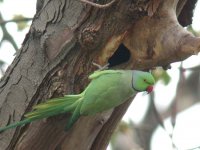The Commodore
Member
We've got at least one pair of Ring Necked Parakeets here in Turweston, north Bucks. I watched their noisy display flights in May and I hoped they might even nest in the large box I'd put in our big lime tree for Jackdaws. I saw the male near it once but it wasn't used.
I also saw a parakeet about a mile away, in Brackley, a few weeks ago.
I know they're spreading in the UK but does anyone know how far and wide? They're an exotic addition to English gardens but are they a pest in any way, and should we be encouraging them?
I also saw a parakeet about a mile away, in Brackley, a few weeks ago.
I know they're spreading in the UK but does anyone know how far and wide? They're an exotic addition to English gardens but are they a pest in any way, and should we be encouraging them?








